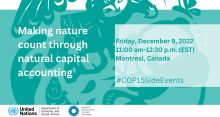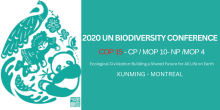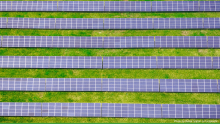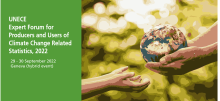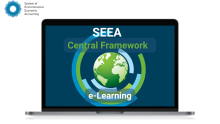This side event at the UN Biodiversity Conference (COP15) is organized by the Secretariat of Convention of Biological Diversity, European Commission, the European Space Agency, the United Nations Statistics Division and the International Union for Conservation of Nature
- 主页
- Events
Events
Upcoming Events
The 15th meeting of the Conference of the Parties (COP 15) to the Convention on Biological Diversity (CBD), the tenth Meeting of the Parties to the Cartagena Protocol on Biosafety (Cartagena Protocol COP/MOP 10) and the fourth Meeting of the Parties to the Nagoya Protocol on Access and B
The 2022 Workshop on Earth Observation for Ecosystem Accounting (EO4EA 2022) is organized by the European Space Agency in collaboration with the Environmental-Economic Account section of the United Nations Statistics Division (UNSD) and the Earth Observations for Ecosystem Accounting initiative of the
The sixth Policy Forum on Natural Capital Accounting (NCA) for Better Policy will take place on 2-3 November 2022. It will convene virtually for two half-days.
The Statistical Institute for Asia and the Pacific (SIAP) of the United Nations is offering the online course "Introduction to energy statistics and energy accounts" in their e-learning platform from 3 October to 18 November 2022.
The 2022 UNECE Expert Forum for Producers and Users of Climate Change-Related Statistics will take place on 29-30 September 2022 in Geneva in an hybrid format. This Forum has been organized annually since 2014 to serve a a platform for collaboration, sharing ideas and expericence, discussing concepts and measurement issues, and identifying areas for development of practical guidance.
The Forum is organized by the UNECE Steering Group on Climate Change-Related Statistics chaired by the Netherlands.
Taking place in Manila on 26-30 September 2022, UNSD and the Philippine Statistics Authority (PSA) are holding a workshop on land accounting.
Natural capital includes both mineral ores, as well as oil and gas (non-renewables) and renewable resources derived from ecosystems. Ecosystems provide many different services to people - they supply us with food and materials, they regulate our water cycles and soils, and they provide us with opportunities for tourism, recreation and reflection. Whereas methods to account for non-renewable resources are well established, the development and application of accounting systems for ecosystems and the services they provide to people is more recent.
The facilitated e-Learning course “Introduction to the System of Environmental Economic Accounting (SEEA): Central Framework” , organized by the UN Statistical Institute for Asia and the Pacific (UN SIAP), will be conducted from 1 August t
Events Calendar
| Sun | Mon | Tue | Wed | Thu | Fri | Sat |
|---|---|---|---|---|---|---|
|
|
|
1 |
2 |
3 |
4 |
5 |
|
6 |
7 |
8 |
9 |
10 |
11 |
12 |
|
13 |
14 |
15 |
16 |
17 |
18 |
19 |
|
20 |
21 |
22 |
23 |
24 |
25 |
26 |
|
27 |
28 |
29 |
30 |
31 |
|
|

